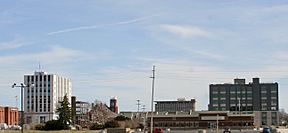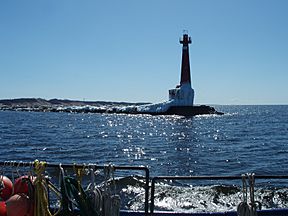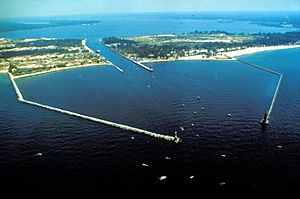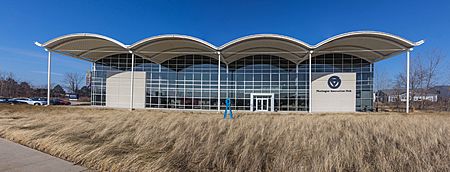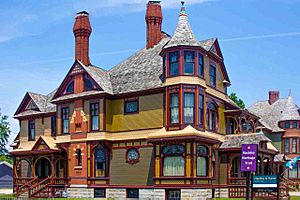Muskegon, Michigan facts for kids
Quick facts for kids
Muskegon, Michigan
|
|
|---|---|
| City of Muskegon | |
|
From left to right, top to bottom: Skyline; Together Rising; 700 Terrace Point; the USS Silversides moored in Muskegon; the Muskegon Pier Light
|
|
| Nickname(s):
Port City, Lumber Queen of the World, Skeetown, Midwest Riviera, Lumbertown
|
|
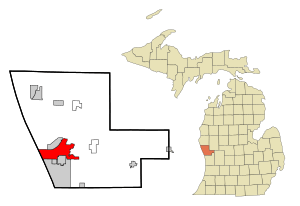
Location of Muskegon within Muskegon County, Michigan
|
|
| Country | United States |
| State | Michigan |
| County | Muskegon |
| Government | |
| • Type | Commission-Manager |
| Area | |
| • City | 18.20 sq mi (47.13 km2) |
| • Land | 14.14 sq mi (36.63 km2) |
| • Water | 4.05 sq mi (10.50 km2) |
| Elevation | 617 ft (191.4 m) |
| Population
(2010)
|
|
| • City | 38,401 |
| • Estimate
(2019)
|
36,565 |
| • Density | 2,585.38/sq mi (998.19/km2) |
| • Urban | 154,729 |
| • Metro | 1,433,288 (Grand Rapids-Holland-Muskegon metropolitan area) |
| Time zone | UTC−5 (EST) |
| • Summer (DST) | UTC−4 (EDT) |
| ZIP codes |
49440-49445
|
| Area code(s) | 231 |
| FIPS code | 26-56320 |
| GNIS feature ID | 1620963 |
| Website | http://www.muskegon-mi.gov/ |
Muskegon ( mus-KEE-gən or mis-KEE-gən) is a city in the U.S. state of Michigan. It is the county seat of Muskegon County. Muskegon is known for fishing, sailing regattas, pleasure boating, and as a commercial and cruise ship port. It is a popular vacation destination because of the expansive freshwater beaches, historic architecture, and public art collection. It is the most populous city along the western shore of Michigan. At the 2020 census the city population was 38,318. It is at the southwest corner of Muskegon Township, but is administratively autonomous.
Muskegon is the center of the Muskegon Metropolitan Statistical Area, which is coextensive with Muskegon County and had a population of 173,566 in 2019. It is also part of the larger Grand Rapids-Kentwood-Muskegon-Combined Statistical Area with a population of 1,433,288.
Contents
History
Early inhabitants
Human occupation of the Muskegon area goes back seven or eight thousand years to the nomadic Paleo-Indian hunters who occupied the area following the retreat of the Wisconsonian glaciations. The Paleo-Indians were superseded by several stages of Woodland Indian developments, the most notable of whom were the Hopewellian type-tradition, which occupied this area, perhaps two thousand years ago.
During historic times, the Muskegon area was inhabited by various bands of the Ottawa and Pottawatomi Indian tribes. In 1830 Muskegon was solely an Ottawa village. Perhaps the best remembered of the Indian inhabitants of the area was Ottawa Indian Chief, Pendalouan. A leading participant in the French-inspired annihilation of the Fox Indians of Illinois in the 1730s, he and his people lived in the Muskegon vicinity during the 1730s and 1740s until induced by the French to move the settlement to the Traverse Bay area in 1742.
The name "Muskegon" is derived from the Ottawa tribe term "Masquigon," meaning "marshy river or swamp".
European arrival
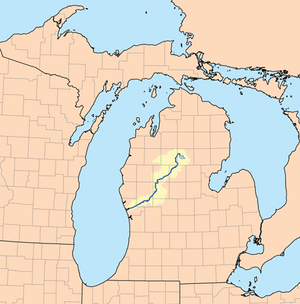
The "Masquigon" River (Muskegon River) was identified on French maps dating from the late seventeenth century, suggesting that French explorers had reached Michigan's western coast by that time. Father Jacques Marquette traveled northward through the area on his fateful trip to St. Ignace in 1675 and a party of French soldiers under La Salle's lieutenant, Henry de Tonty, passed through the area in 1679.
The earliest known Euro-American resident of the county was Edward Fitzgerald, a fur trader and trapper who first came to the Muskegon area in 1748 and who died there, reportedly being buried in the vicinity of White Lake. Sometime between 1790 and 1800, a French-Canadian trader named Joseph La Framboise established a fur trading post at the mouth of Duck Lake. Between 1810 and 1820, several French Canadian fur traders, including Lamar Andie, Jean Baptiste Recollect and Pierre Constant had established fur trading posts around Muskegon Lake.
Euro-American settlement of Muskegon began in earnest in 1837, which coincided with the beginning of the exploitation of the area's extensive timber resources. The commencement of the lumber industry in 1837 inaugurated what some regard as the most romantic era in the history of the region. Lumbering in the mid-nineteenth century brought many settlers, especially ones from Germany, Ireland, and Canada.
Some neighborhoods of Muskegon began as separate villages. Bluffton was founded as a lumbering village in 1862 in Laketon Township. It had its own post office from 1868 until 1892. It was annexed by Muskegon in 1889.
Geography and climate
According to the United States Census Bureau, the city has a total area of 18.12 square miles (46.93 km2), of which 14.21 square miles (36.80 km2) is land and 3.91 square miles (10.13 km2) is water. The city is adjacent to Lake Michigan to the west and Muskegon Lake to the north. The Muskegon River empties into Muskegon Lake at the city's northeast end.
| Climate data for Muskegon, Michigan | |||||||||||||
|---|---|---|---|---|---|---|---|---|---|---|---|---|---|
| Month | Jan | Feb | Mar | Apr | May | Jun | Jul | Aug | Sep | Oct | Nov | Dec | Year |
| Record high °F (°C) | 63 (17) |
67 (19) |
82 (28) |
86 (30) |
93 (34) |
98 (37) |
99 (37) |
99 (37) |
95 (35) |
86 (30) |
76 (24) |
64 (18) |
99 (37) |
| Average high °F (°C) | 30.8 (−0.7) |
33.2 (0.7) |
43.0 (6.1) |
55.9 (13.3) |
66.9 (19.4) |
76.0 (24.4) |
80.4 (26.9) |
78.8 (26.0) |
71.3 (21.8) |
58.8 (14.9) |
46.4 (8.0) |
35.1 (1.7) |
56.4 (13.6) |
| Average low °F (°C) | 19.1 (−7.2) |
20.1 (−6.6) |
26.0 (−3.3) |
36.3 (2.4) |
45.9 (7.7) |
55.6 (13.1) |
60.9 (16.1) |
60.0 (15.6) |
51.8 (11.0) |
41.5 (5.3) |
33.0 (0.6) |
24.3 (−4.3) |
39.5 (4.2) |
| Record low °F (°C) | −21 (−29) |
−30 (−34) |
−11 (−24) |
1 (−17) |
22 (−6) |
31 (−1) |
39 (4) |
36 (2) |
27 (−3) |
19 (−7) |
−14 (−26) |
−15 (−26) |
−30 (−34) |
| Average precipitation inches (mm) | 2.00 (51) |
1.82 (46) |
2.23 (57) |
2.91 (74) |
3.25 (83) |
2.55 (65) |
2.37 (60) |
3.39 (86) |
3.89 (99) |
3.11 (79) |
3.35 (85) |
2.55 (65) |
33.42 (849) |
| Average snowfall inches (cm) | 29.7 (75) |
18.5 (47) |
8.8 (22) |
2.2 (5.6) |
0 (0) |
0 (0) |
0 (0) |
0 (0) |
0 (0) |
0.2 (0.51) |
6.0 (15) |
28.3 (72) |
93.7 (238) |
| Average precipitation days (≥ 0.01 in) | 15.7 | 12.2 | 11.2 | 12.1 | 10.7 | 9.0 | 9.5 | 9.0 | 10.1 | 11.9 | 14.1 | 15.7 | 141.1 |
| Average snowy days (≥ 0.1 in) | 15.3 | 11.0 | 6.1 | 1.7 | 0 | 0 | 0 | 0 | 0 | 0.3 | 4.0 | 12.9 | 51.4 |
| Source 1: NOAA (normals 1981−2010), | |||||||||||||
| Source 2: ThreadEx (extremes 1892−2012) | |||||||||||||
Geographic features
- Bear Lake
- Muskegon Lake
- Mona Lake
- Lake Michigan
- Muskegon River
Demographics
| Historical population | |||
|---|---|---|---|
| Census | Pop. | %± | |
| 1860 | 1,450 | — | |
| 1870 | 6,002 | 313.9% | |
| 1880 | 11,262 | 87.6% | |
| 1890 | 22,702 | 101.6% | |
| 1900 | 20,818 | −8.3% | |
| 1910 | 24,062 | 15.6% | |
| 1920 | 36,570 | 52.0% | |
| 1930 | 41,390 | 13.2% | |
| 1940 | 47,697 | 15.2% | |
| 1950 | 48,429 | 1.5% | |
| 1960 | 46,485 | −4.0% | |
| 1970 | 44,631 | −4.0% | |
| 1980 | 40,823 | −8.5% | |
| 1990 | 40,283 | −1.3% | |
| 2000 | 40,105 | −0.4% | |
| 2010 | 38,401 | −4.2% | |
| 2019 (est.) | 36,565 | −4.8% | |
| U.S. Decennial Census | |||
2010 census
As of the census of 2010, there were 38,401 people, 13,967 households, and 7,895 families residing in the city. The population density was 2,702.4 inhabitants per square mile (1,043.4/km2). There were 16,105 housing units at an average density of 1,133.4 per square mile (437.6/km2). The racial makeup of the city was 57.0% White, 34.5% African American, 0.9% Native American, 0.4% Asian, 2.6% from other races, and 4.5% from two or more races. Hispanic or Latino of any race were 8.2% of the population.
There were 13,967 households, of which 32.5% had children under the age of 18 living with them, 27.9% were married couples living together, 22.9% had a female householder with no husband present, 5.8% had a male householder with no wife present, and 43.5% were non-families. 36.0% of all households were made up of individuals, and 12.8% had someone living alone who was 65 years of age or older. The average household size was 2.38 and the average family size was 3.09.
The median age in the city was 34.1 years. 23.3% of residents were under the age of 18; 12.2% were between the ages of 18 and 24; 28.8% were from 25 to 44; 24.1% were from 45 to 64, and 11.6% were 65 years of age or older. The city's gender makeup was 52.1% male and 47.9% female.
Culture and recreation
Music and fine arts
Muskegon County is home to Blue Lake Fine Arts Camp, located in the Manistee National Forest in the town of Twin Lake.
Once a movie house, the Frauenthal Center for the Performing Arts includes two theaters (the main Frauenthal house and the smaller Beardsley Theater in the adjoining Hilt Building). It was refurbished in 1998, and runs JAM Theatrical productions, Muskegon Civic Theatre productions, is home of the West Michigan Symphony Orchestra, was the venue for all Muskegon Community Concert Association events, and used to be home to the now-defunct Cherry County Playhouse. The Frauenthal was originally built as the Michigan Theater in 1929.
Muskegon also has one of the founding chapters of the Barbershop Harmony Society.
Muskegon also houses a moderate-sized private collection of fine art in the Muskegon Museum of Art.
Festivals
A lackluster attendance in 2011 caused the cancellation of the 2012 Muskegon Summer Celebration festival. A new festival, Rockstock (formerly Coast West) has taken its place. The Art Fair also returned in 2013. The Art fair has grown to become one of the largest and well-attended art fairs in the State of Michigan.
Muskegon Bike Time is held every July. The most well-attended aspect of Bike Time is Rebel Road - a 6 block stretch of Western Avenue in downtown Muskegon, when 50,000+ bikes and more than 100,000 visitors spend much of the 4-days festival. Bike Time and Rebel Road were attended by more than 100,000 people in 2016.
The Muskegon Motorcycle Club, organized in 1920, hosts the Hill Climb every other year, an American Motorcycle Association (AMA) sanctioned race.
The Muskegon Film Festival is held in May.
Each August, the Unity Christian Music Festival takes place at Heritage Landing. In May, Rock the Coast takes place at Michigan's Adventure. Both are organized by Alive on the Lakeshore.
In September, the Michigan Irish Music Festival brings renowned Celtic musicians to Heritage Landing on the shore of Muskegon Lake. Artists have included Tommy Makem, Gaelic Storm, Slide, The Old Blind Dogs, Scythian and many more. In addition to music, Irish food, beverages, merchandise and cultural exhibits contribute to the appeal of this event. The Michigan Feis (Irish Dance competition) is affiliated and is held at Muskegon Catholic Central High School.
Muskegon also plays host to Moose Fest each August, as well as the Muskegon Polish Festival each September.
In early October, the International Buster Keaton Society visit Muskegon to host their annual convention. The event features public showings of Keaton films at the Frauenthal Theater.
Museums and theater
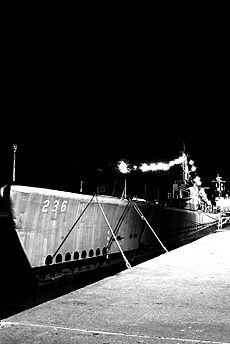
Broadway at the Frauenthal (fall through spring) brings Broadway musicals to Muskegon. Muskegon is also home to Muskegon Museum of Art and West Michigan Symphony Orchestra. The Muskegon Community Concert Association provides concerts from September through May.
Lakeshore Museum Center (formerly known as Muskegon County Museum) and Hackley & Hume Historic Site: Mansions built by Muskegon's lumber barons themselves are restored to their old glory and open to the public. The Hackley & Hume mansions are part of downtown Muskegon's Heritage Village—2 blocks from Muskegon Lake, and a National Register Historic District. The mansions are operated with the Lakeshore Museum Center, which details the grand, rich history of Muskegon County, from the Pottawatomi and Ottawa Native American tribes and lakeside fur traders to the Lumber Queen of the World to today. Also includes science and nature exhibits.
The Muskegon Museum of Art is touted as one of the finest art museums in the Midwest. Among the highlights of its permanent collection is Tornado Over Kansas, by John Steuart Curry (one of three leading painters, along with Grant Wood and Thomas Hart Benton, identified as Regionalists and known for their canvases celebrating the rural Midwest).
Muskegon is also the home of the USS Silversides Submarine Museum which features the USS Silversides, a World War II submarine; the USS LST-393, a World War II amphibious landing ship; and the USCGC McLane, a Prohibition-era United States Coast Guard cutter.
In addition, Muskegon also berths the S.S. Milwaukee Clipper, a former car ferry that traveled the same route as Lake Express does today. The ship (which is a National Historic Landmark) is in the middle of a long process of being restored to its original form, but in the meantime is open for tours and hosts a museum aboard the vessel with information on both the Milwaukee Clipper, as well as the history of maritime in Muskegon. Muskegon is an historical port for commerce and lake travel. The lumbering era through World War II was its busiest historical use. Its image as a port the city has embraced with the local nickname 'The Port City'. It possesses a fine deep-water port and still functions delivering bulk cement, aggregate, and large cargoes to several lakeshore facilities, also coal to the B.C. Cobb power plant, an outdated coal-burning facility due to shut down.
- The Muskegon Heritage Museum-The Muskegon Heritage Association is non-profit corporation founded in 1973 to promote the enhancement of Muskegons Historic Resources. One of the MHA's missions is to maintain a museum to show the economic, industrial and social history of the greater Muskegon area.The Museum was begun by the MHA in 1983 to accommodate the donated Corliss Valve 90 hp steam engine. The goal of the museum is to preserve information, photos and artifacts pertaining to: The Industries of the Muskegon Area, Historic/Heritage Homes and Businesses of Muskegon. In 2009 a revitalization of the museum began with a complete rearrangement of the main room adding new displays in the cases and on the walls. A print shop was set up and an Industrial section in the back building was rearranged. Printed signs for all displays were added. In 2010 the museum was expanded into what was the shoe store next door. During 2011-2012 we reconfigured and remodeled the 2nd floor of the building where the Corliss Engine is housed. This is a "Made in Muskegon" exhibit. The museum also added a classroom that accommodates 35 people comfortably with all the AV equipment necessary for any presentation.
- Carr-Fles Planetarium, Muskegon
- The Muskegon Area Sports Hall of Fame exhibits, detailing the area's rich athletic past, are on display at the L.C. Walker Arena.
Outdoor recreation
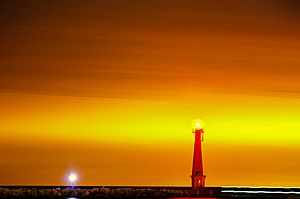
Muskegon State Park has a Winter Sports Complex that features ice fishing, cross-country skiing, ice skating, and a Luge track.
P.J. Hoffmaster State Park has many sand dunes as well as two campgrounds and a public beach for tourists to enjoy.
Pere Marquette Beach is the largest free public beach on the eastern shore of Lake Michigan, and one of the loveliest in the state. Windsurfing, kite boarding competitions, and professional volleyball tournaments are held there. Its quartz sand beach is a Clean Beaches Counsel certified beach. The beach area is popular with cyclists, runners and hikers, and sand dunes border the beach to the east.
Muskegon Lake is a first class walleye fishery and has many other freshwater species including the Lake Perch. Lake Michigan off Muskegon hosts large numbers of coho and Chinook salmon, steelhead, brown trout, lake perch and many other game fish.
Sailing and recreational boating are major summer pastimes with many services and marinas in the area for boats of all sizes.
Muskegon Lakeshore Bike Trail allows for biking along the shores of Muskegon Lake to Lake Michigan. There are two trails that consist the Muskegon bike paths, one runs along the east side of Muskegon and the other along the north side.
Michigan's Adventure, the largest amusement park in the state, is located in Muskegon County, a few miles north of the city of Muskegon. Michigan's Adventure features a midway with roller coasters, general rides, amusements, and a full water park.
Sports
| Club | Sport | League | Venue |
| Muskegon Lumberjacks | Ice hockey | United States Hockey League | L.C. Walker Arena |
| West Michigan Lake Hawks | Basketball | American Basketball Association | Reeths-Puffer High School |
| Muskegon Mustangs | Football | Great Lakes Football League | Oakridge High School |
| West Michigan Ironmen | Indoor football | American Indoor Football | L.C. Walker Arena |
| Muskegon Risers | Soccer | Independent | L.C. Walker Arena and Reeths-Puffer H.S. |
Previous sports teams to play in Muskegon have included:
| Club | Sport | Played from | League | Stadium |
|---|---|---|---|---|
| Muskegon Lumberjacks/Fury (1992–2010) | Hockey | 1992−2010 | IHL, UHL | L.C. Walker Arena |
| Muskegon Thunder | Indoor football | 2007−2009 | IFL | L.C. Walker Arena |
| Michigan Mayhem | Basketball | 2004−2006 | CBA | L.C. Walker Arena |
| Muskegon Lumberjacks (1984–1992) | Hockey | 1984−1992 | IHL | L.C. Walker Arena |
| Muskegon Mohawks | Hockey | 1965−1984 | IHL | L.C. Walker Arena |
| Muskegon Zephyrs | Hockey | 1960−1965 | IHL | L.C. Walker Arena |
| Muskegon Lassies | Baseball | 1946−1949 | AAGPBL | Marsh Field |
The Chronicle Seaway Run is run every year in late June. It features a 15k race, 5k race, 5k walk for fun, 15k wheelchair race.
Infrastructure
Transportation
Public transportation is provided by the Muskegon Area Transit System (MATS – "The Shore Line"), which operates nine bus routes, three trolley routes, and a paratransit system. MATS and Greyhound serve the Herman Ivory Passenger Terminal.
MATS operates the Muskegon Trolley Company. Three routes cover north side, south side, and downtown; each trolley stops at 11 locations, including Hackley and Hume Historic Site, USS Silversides, and Muskegon State Park. (Memorial Day through Labor Day, daily; no trips during special events.)
Commercial air service is currently provided by United Express operating regional jet flights on behalf of United Airlines at Muskegon County Airport (MKG), with nonstop service to Chicago O'Hare Airport. Other airlines provide passenger service via the Gerald R. Ford International Airport (GRR) in Grand Rapids.
Muskegon is the eastern port of the Lake Express High Speed Car Ferry that crosses Lake Michigan to Milwaukee, Wisconsin offering three roundtrips a day in the summer, and two roundtrips in the fall. There are many bike paths being built around the area.
CSX Transportation, along with the Michigan Shore Railway, provide rail service for many of Muskegon's industries. Rail passenger services ended in the 1960s. The nearest passenger rail available is via Amtrak in nearby Holland or Grand Rapids.
Several major highways serve the city, including:
Major roads
|
Interstates |
U.S. Highways
|
Other state highways
|
Rail
Until 1971, the Chesapeake & Ohio Railway (successor to the Pere Marquette Railway) operated day and night trains from Union Station to Holland and Chicago. The Grand Trunk Western and the Pennsylvania Railroad had earlier operated passenger trains out of another Muskegon station to various points in Michigan.
Ferries
In 1937, the Grand Trunk Western began operating ferries that met up with train and carried passengers and automobiles across Lake Michigan to Milwaukee. Earlier, the GTW had operated the ferries out of Grand Haven. The GTW stopped operating the ferries in 1978. The last remaining ferries across the lake would be the ones launching from Ludington, Michigan until the Lake Express first came into service in June 1, 2004.
Sister cities
 Ōmuta, Fukuoka Prefecture, Japan
Ōmuta, Fukuoka Prefecture, Japan Hartlepool, England, UK
Hartlepool, England, UK Antalya, Turkey
Antalya, Turkey
Economy
Downtown Muskegon
Downtown Muskegon serves as the hub for much of Muskegon County. Positioned along the southern shoreline of Muskegon Lake, it stretches for nearly two miles. Downtown is home to a number of hotels, a 25,000 square foot convention center completed in 2021, and the Historic Mercy Health Ice Arena. Downtown Muskegon is lauded for its walkability and ease of parking. The Muskegon Farmer's Market welcome more than 10,000 visitors every Saturday in the summer, and the boutique pop-up shops of the Western Market are a popular tourist attraction. Beginning in 2014, downtown Muskegon experienced a resurgence of investment, resulting in the construction of numerous mixed-use buildings, condominium buildings, apartment buildings, and small businesses. Some of the downtown's newer additions include Pigeon Hill Brewing, Rad Dad's Tacos and Tequila Bar, Unruly Brewing, Rake Beer Project, Burl and Sprig Distilling, 18th Amendment Distilling, Boomtown Market, Vintage Redefined Boutique, Polk-a-dot Paisley, The Crue Barber Shop, Drip Drop Drink Coffee, Aldea Coffee, Dr. Rolf's Barbecue, The No Name Saloon, Smash Wine Bar, The Century Club Shops, and many others.
Major employers
- ADAC Automotive – automotive components manufacturing
- Howmet (Whitehall, Michigan, formerly Alcoa) – aerospace components manufacturing
- Anderson Global (formerly Anderson Pattern)
- Brunswick Bowling Products, LLC
- Cannon-Muskegon Corporation – specialty alloys
- Century Foundry
- Cole's Quality Foods – garlic bread, frozen foods
- Consumers Energy
- Eagle Group
- Fleet Engineers
- GE Aviation (formerly Johnson Technology) – turbine engine components manufacturing
- Great Lakes Die Cast (formerly Dilesco)
- Kaydon Corp – precision bearings
- Knoll Inc.
- L3 Communications (formerly Teledyne) – armored vehicle manufacturing
- Mahle (formerly Dana, formerly Sealed Power) – piston rings, aerospace
- Meijer
- Mercy Health – member of Trinity Health
- Michigan's Adventure – amusement park (Michigan's largest amusement park and water park)
- Nugent Sand
- Port City Group
- Pratt & Whitney Component Solutions – a Raytheon Technologies Company
- SAF-Holland – Muskegon (formerly Neway Equipment Company) – commercial vehicle axles, suspensions, and coupling devices
- Wesco, Inc. (headquarters)
Shopping
Locally owned shops and a farmer's market are found in the historic downtown, with more shops along the Muskegon Lake waterfront and in neighborhoods. Regional shopping is found throughout the county, including major retailers such as Meijer, Walmart, J. C. Penney's, and more.
Sports
| Club | Sport | League | Venue |
|---|---|---|---|
| Muskegon Lumberjacks | Ice hockey | United States Hockey League | Mercy Health Arena |
| West Michigan Lake Hawks | Basketball | American Basketball Association | Muskegon High School |
| Muskegon Mustangs | Football | Great Lakes Football League | Oakridge High School |
| West Michigan Ironmen | Indoor football | American Arena League | Mercy Health Arena |
| Muskegon Risers SC | Soccer | UPSL & Premier Arena Soccer League | Mercy Health Arena and Kehern Stadium |
| Muskegon Clippers | Baseball | Great Lakes Summer Collegiate League | Marsh Field |
Previous sports teams to play in Muskegon have included:
| Club | Sport | Played from | League | Stadium |
|---|---|---|---|---|
| Muskegon Lumberjacks/Fury (1992–2010) | Hockey | 1992−2010 | IHL, UHL | Mercy Health Arena |
| Muskegon Thunder | Indoor football | 2007−2009 | IFL | Mercy Health Arena |
| Michigan Mayhem | Basketball | 2004−2006 | CBA | Mercy Health Arena |
| Muskegon Lumberjacks (1984–1992) | Hockey | 1984−1992 | IHL | Mercy Health Arena |
| Muskegon Mohawks | Hockey | 1965−1984 | IHL | Mercy Health Arena |
| Muskegon Zephyrs | Hockey | 1960−1965 | IHL | Mercy Health Arena |
| Muskegon Lassies | Baseball | 1946−1949 | AAGPBL | Marsh Field |
The Seaway Run is run every year in late June. It features a 15k race, 5k race, 5k walk for fun, 15k wheelchair race.
Education
Muskegon Public Schools was founded in 1860 and serves students from preschool through grade 12. Additionally, it runs the Muskegon Training and Education Center. Muskegon is also served by these private K-12 schools: Muskegon Catholic Central, Fruitport Calvary Christian, and Western Michigan Christian.
In 2010, North Muskegon High School was noted as the top performing public school in the State of Michigan by the state Department of Education.
The City of Muskegon is also served by Muskegon Community College and Baker College.
Grand Valley State University's Muskegon Campus is home to the Muskegon Innovation Hub (formerly MAREC) and Annis Water Resources Institute (AWRI) inside the Lake Michigan Center in downtown Muskegon.
Western Michigan University, Ferris State University, and Grand Valley State University all operate programs out of the Stevenson Center for Higher Education on Muskegon Community College campus. It is designed so an undergraduate at MCC may transfer to any of the above schools and complete a Bachelors and/or Masters degree without leaving Muskegon.
Notable people
- John Beyrle, son of Joseph Beyrle, U.S. Ambassador to the Russian Federation confirmed July 3, 2008.
- Joseph Beyrle, only soldier to have served in both the US Army and the Soviet Army in World War II
- Nancy Anne Fleming, Miss America 1961
- Vonda Kay Van Dyke, Miss America 1965
- Captain Jonathan Walker, "The Man With Branded Hand" abolitionist
Business and politics
- Margaret Bailey Chandler, community leader and member of the Little River Band of Ottawa Indians
- Charles Hackley (1837–1905), lumber baron, philanthropist (Hackley Hospital, Hackley Library, Hackley Administration Building, Hackley Avenue, Hackley Art Gallery, Hackley Park); after a gift of $12 million to the community, the city of Muskegon considered changing its name to "Hackleyville"
- George Edward Hilt, founder of the largest U.S. farm-store retailer
- Richard Mell, politician
Religion
- Jim Bakker, TV evangelist
- Edmund Cardinal Szoka, cardinal, President Emeritus of the Pontifical Commission for Vatican City State
Science and technology
- Clara H. Hasse (1880–1926), botanist
- David Leestma, astronaut
- W. Wesley Peterson, mathematician and computer scientist, invented the Cyclic Redundancy Check (CRC)
Artists
- Haddon Sundblom, graphic artist, created popular images of Santa Claus for Coca-Cola
Authors
- Laurie Keller, children's book writer and illustrator best known for The Scrambled States of America and Grandpa Gazillion's Number Yard
- Douglas Malloch, the “lumberman’s poet”
- John Frederick Nims, poet
- Cathy O'Brien, conspiracy theorist and author
- Lewis B. Smedes, theologian and author
- Bob Wood, author of Dodger Dogs to Fenway Franks and Big Ten Country
Music
- Børns, singer and songwriter, born in Muskegon
- Steve Gorman, drummer, Black Crowes, born in Muskegon
- Rick Johnson, musician, bass player for Mustard Plug
- Bettye LaVette, soul singer
- Iggy Pop, punk rock icon
- Louise Cooper Spindle, composer
- Wayne Static, lead singer and guitarist for industrial metal band, Static-X
- Bill Szymczyk, music producer of the Eagles, The Who and others
- Gerry Teifer, music publisher, songwriter, performer
- Richard Versalle, opera singer
Stage
- Buster Keaton, iconic comedian and film director; born in Kansas and spent childhood summers in Muskegon with his family in the Muskegon Actors' Colony; a vaudevillian who traveled constantly except in summer, Keaton regarded Muskegon as his home town.
- Kate Reinders, Broadway actress, played Glinda in Wicked and Caroline in Good Vibrations
- Carly Jibson, Broadway and television actress, played Tracy Turnblad in the first national tour company of Hairspray and originated the role of Pepper in the musical Cry Baby.
Television
- Matt Crouch, film producer and CEO of TBN
- Harry Morgan, versatile stage, film and TV actor, played Colonel Potter on the TV series M*A*S*H (1972–1983)
- Frank Stanton, former president of CBS
Sports
- Justin Abdelkader – NHL player, Detroit Red Wings
- Curtis Adams – NFL player, San Diego Chargers
- Beatrice Allard – All-American Girls Professional Baseball League player
- Virginia Bell – served in the Women's Army Corps in Japan during World War II and later joined the All-American Girls Professional Baseball League
- Donna Cook – AAGPBL player
- Doris Cook – AAGPBL player
- Deyonta Davis – NBA player, Memphis Grizzlies
- Paul Dekker – NFL and CFL player
- Miss Dougal – AAGPBL player, 1953 Muskegon Belles
- Tony Ferguson – winner of Ultimate Fighter Season 13
- Bill Green – hammer thrower, former U.S. record holder, 5th place in 1984 Olympic Games
- Bobby Grich – MLB All-Star second baseman for the Baltimore Orioles and California Angels
- Mark Grimmette – men's double luge, winner of Olympic silver (2002) and bronze (1998) medals
- Mark Hughes – basketball player and coach
- Ronald Johnson – University of Southern California and San Francisco 49ers wide receiver
- Alta Little – AAGPBL player
- Ruvell Martin – NFL player for the Seattle Seahawks
- Beulah McGillicutty – manager in Extreme Championship Wrestling
- Nate McLouth – MLB player for the Washington Nationals
- Earl Morrall – Michigan State and NFL quarterback, three-time Super Bowl champion
- Robert Morse – NFL player for the New Orleans Saints
- Drew Naymick – professional basketball player
- Don Nelson – NBA player for Boston Celtics and coach in Basketball Hall of Fame, University of Iowa basketball player
- Ray Newman – MLB pitcher
- Bennie Oosterbaan – three-time University of Michigan All-American football player and head coach
- Marley Shriver - Olympic swimmer
- Terrance Taylor – Detroit Lions defensive tackle
Images for kids
-
The United States Post Office in Muskegon, 1904
See also
 In Spanish: Muskegon para niños
In Spanish: Muskegon para niños


